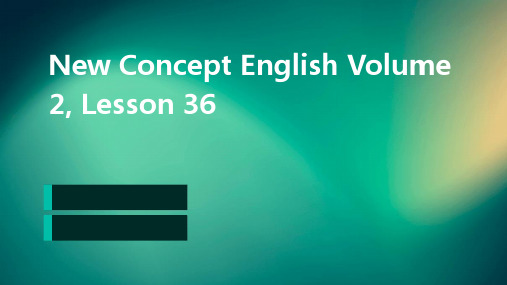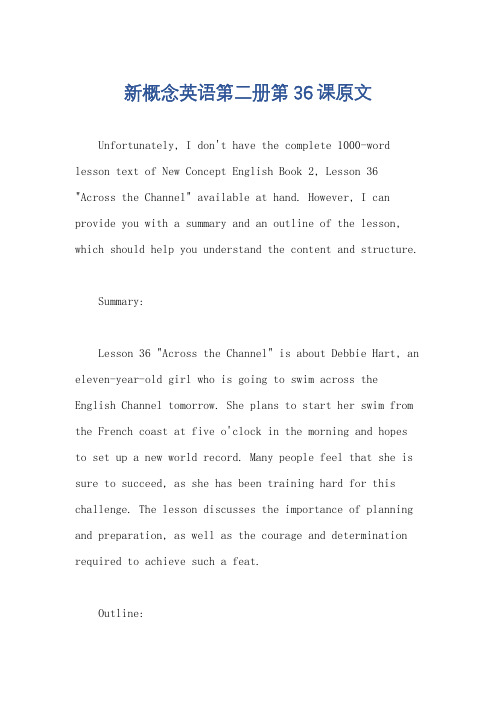新概念英语第二册Lesson36~40课文注释
新概念英语第二册第三十六

"She sings beautifully."
Rule 2
Use the continuous tense to describe ongoing actions in the present.
Example
"He is studying hard to pass the exam."
Practice vocabulary and phrases
总结词:巩固所学
01
02
详细描述:通过练习,巩固本课所学的词汇 和短语,加深理解和记忆。
总结词:拓展词汇量
03
04
详细描述:通过练习,拓展词汇量,提高 英语表达的丰富性和准确性。
总结词:提高口语能力
05
06
详细描述:通过练习,提高口语表达能力 ,增强英语口语的流利度和准确性。
01 Overview of Text Content
Topic of the text
The topic of the text is about the importance of learning English.
The text emphasizes the need for English language proficiency in today's globalized world.
02 Words and expressions
New vocabulary
vocabulary
expression
指代某一领域或主题的特定词汇和短 语。
指在特定语境下使用的固定短语或措 辞,通常具有特定的含义或情感色彩。
phrase
指由两个或两个以上的单词组成的固 定组合,通常表达一个完整的意思。
新概念第二册lesson36

Lesson 36 Across the Channel【New words and expressions】(8)★record n. 记录;vt. 记录break the record 破记录set up a record = make a record 创记录hold the record = keep the record 保持记录equalize the recorder 平记录(equalize vt.使相等, 补偿)recorder n. 录音机如果同一词音节落在第一个音节的重音, 肯定是名词, 重音落在第二个音节肯定是动词record present n. 礼物;adj. 现在的;v. 赠送desert n. 沙漠;v. 废弃★strong adj. 强壮的as strong as horse 象牛一样壮(马)strong wind 大风;heavy rain 大雨strong girl (隐示不是很瘦, 结实)strong mind 意志坚强Out of sight,out of mind. 眼不见, 心不烦Sturdy adj. 结实的, 强健的robust adj. 身体结实(“乐百事” 英文名)strong +运动员获胜把握比较大,强有力的(“强有力的对手”中的“强有力”就用strong表达)★swimmer n. 游泳的人, 游泳者swimmer 确切的意思是游泳者, 游泳的人strong swimmer 游泳能手athlete n. 运动员(运动会上常说的运动员)swimming athlete 游泳运动员(这里的“-ing”意为“用来” )★succeed v. 成功succeed in doing sth. 做……成功success n. 成功, 成功的人successful adj. 成功的be successful in doing sthfail v. 失败fail to do sth. 做……失败failure n. 失败, 失败者, 缺乏, 失灵, 故障, 破产, 疏忽, <美>不及格★train v. 训练train sb. to do sth. 训练某人做……(教, 而且有让人形成某种技能)teach sb. to do sth. 教某人做……(只是教, 会不会不管)trainer n. 教练;trainee n. 受训的人training center 训练中心★anxiously adv. 焦急anxious adj. 焦急的★intend v. 打算intend to do sth.=be going to do sth. 打算做某事★solid ①adj. 固体的②adj. 硬的,结实的,坚固的(指家具、建筑物等)③n. 固体【课文讲解】1、Across the Channelacross 横渡the Channel=the English Channel 英吉利海峡(当“C”大写时, 一定是指the English Channel)2、She is going to set out from the French coast at five o'clock in the morning.set out 出发;set out from… 从某地出发3、She is a strong swimmer and many people feel that she is sure to succeed.feel (that) +从句认为……,相信……(宾语从句中的that 可以省略)be sure to do sth. 一定能够, 必定会(肯定语气比“must”(must + 动词原形,表示一定, 一种推测)强,对某件事情动词有把握)be sure of… (对某件事情, 名词做宾语)be sure that… (对某件事情, 某人做某事有把握)4、Debbie's father will set out with her in a small boat....with her 同她一道by boat ,in a boat乘船5、Tomorrow he will be watching her anxiously as she swims the long distance to England.will be doing 将来进行时表达将来as=when swim + 距离游过多长距离6、Debbie intends to take short rests every two hours.rest作“休息”讲时,可以是可数名词,也可以是不可数名词:Today is my day of rest. 今天是我的休息日。
新概念英语第二册Lesson36~40课文注释

新概念英语第二册Lesson36~40课文注释新概念英语作为家喻户晓的经典之作,它有着全新的教学理念,下面小编就和大家分享新概念英语第二册Lesson36~40课文注释,希望有了这些内容的帮助,可以为大家学习新概念英语提供帮助!新概念英语第二册Lesson36课文注释1.…she hopes to set up a new world record.……她希望创一项新的世界纪录。
set up 是个固定短语,它的含义之一为“创立”、“建立”,可以指某个具体的事物,如set up a school(创建一所学校),也可以指抽象的,如某个机构、组织等。
a world record 常用于指体育方面的世界纪录。
2.…many people fee that she is sure to succeed.……很多人认为她一定能成功。
(1) feel在此处为及物动词,表示“认为”、“相信”等:Tom feels that he can pass the examination.汤姆认为他能通过这次考试。
My parents feel that they can believe in you.我父母认为他们可以信赖你。
(2) sure在这里表示“一定会”、“必定会”,后面通常跟带to的不定式:Billy is sure to win the race.比利一定会赢得这场比赛。
If you don t work hard, you are sure to fail in the next exam.你如果不用功学习,下次考试肯定会不及格。
3.Tomorrow he will be watching her anxiously as she swims the long distanceto England. 明天他将焦急地注视着女儿游过这段漫长的距离到达英国。
这句话中主句的时态为将来进行时(cf.第13课语法),时间状语从句表示的虽然也是将来的动作,但用的是一般现在时,再如:I ll be meeting her at the station when she arrives tomorrow.她明天到达时我将在车站接她。
lesson36新概念第二册第36课

描述表达2的详细内容。
表达3
描述表达3的详细内容。
词汇扩展
01
02
03
词汇扩展1
描述词汇扩展1的详细内 容。
词汇扩展2
描述词汇扩展2的详细内 容。
词汇扩展3
描述词汇扩展3的详细内 容。
03
语法点解析
重点语法结构
过去进行时
表示过去某个时间正在进 行的动作,常与when引导 的时间状语从句一起使用。
语法练习
总结词
时态和语态
详细描述
通过时态和语态的练习,学生可以深入理解英 语语法的规则,提高句子结构的பைடு நூலகம்确性。
总结词
从句和句子结构
详细描述
通过从句和句子结构的练习,学生可以更好地组织 语言,使表达更加清晰和有条理。
复杂句子的简化
总结词
详细描述
通过复杂句子的简化练习,学生可以提高阅读理解能力 ,更好地理解英语文章。
被动语态
表示主语是动作的接受者, 常用于描述客观事实或强 调动作对主语的影响。
情态动词
表示推测、可能或必要的 意义,如may、might、 should等。
难点语法解析
过去进行时与一般过去时的区别
01
过去进行时强调过去某个时间正在进行的动作,而一般过去时
则表示过去某个时间已经完成的动作。
被动语态与主动语态的转换
新概念第二册第36课
• 课文内容概述 • 词汇和表达 • 语法点解析 • 课文中的文化知识 • 练习与巩固
01
课文内容概述
课文主题
• 课文主题为“The double life of Alfred Bloggs”。讲述了阿 尔弗雷德·布洛格斯(Alfred Bloggs)的双重生活,他在白天 是一名普通的办公室职员,而在晚上则是一名活跃的业余拳击 手。
新概念英语第二册第36课课件

1)表打算 他打算这周末去野餐。
He is going to have a picnic this weekend. He intends to have a picnic this weekend.
be going to 的基本用法:
3)表决心 他决心成为一名好学生。 He is going to be a good student.
1. Watch (something happening) 正在发生的事情),注视,注意看
观看 (
你非得看我吃晚饭吗?
Do you have to watch me eating my supper?
How long have you been watching the race?
2. Look at 仔细看,(留意)看
5. Tomorrow he will be watching her anxiously as she swims the long distance to England.
will be doing 将来进行时表达将来 as=when swim + 距离 游过多长距离
6.Debbie intends to take short rests every two hours.
• strong adj.强壮的
• 象牛一样壮(马) • as strong as a horse
• strong wind 大风; heavy rain 大雨
• (隐示不是很瘦, 结实) • strong girl
• 意志坚强 • strong mind
• succeed v.成功
• succeed in doing sth. 做……成功
新概念英语第二册第36课原文

新概念英语第二册第36课原文Unfortunately, I don't have the complete 1000-word lesson text of New Concept English Book 2, Lesson 36 "Across the Channel" available at hand. However, I can provide you with a summary and an outline of the lesson, which should help you understand the content and structure.Summary:Lesson 36 "Across the Channel" is about Debbie Hart, an eleven-year-old girl who is going to swim across the English Channel tomorrow. She plans to start her swim from the French coast at five o'clock in the morning and hopes to set up a new world record. Many people feel that she is sure to succeed, as she has been training hard for this challenge. The lesson discusses the importance of planning and preparation, as well as the courage and determination required to achieve such a feat.Outline:1. Introduction: Brief introduction to the topic and the main character, Debbie Hart.2. Background: Information about the English Channel and the challenge of swimming across it.3. Debbie's Preparation: Details about how Debbie has been training and preparing for this swim.4. The Big Day: Description of the day Debbie is going to swim across the Channel, including her early morning start and the support she receives from friends and family.5. The Swim: Narrative of Debbie's swim, focusing on her experience, challenges faced, and her determination to succeed.6. The Finish: Description of Debbie's arrival at the English coast and her reaction to completing the swim.7. Conclusion: Summary of the lesson, emphasizing theimportance of planning, preparation, courage, and determination in achieving goals.Please note that this is just a summary and outline of the lesson, and the actual lesson text would be much longer and more detailed. If you have access to the actual textbook, I would recommend reading the lesson in its entirety to fully understand the content and language used.。
新概念英语第二册Lesson40_42课文注释

新概念英语第二册Lesson40~42课文注释新概念英语第二册Lesson40课文注释1.next to, 挨着。
它既可以表示座位挨着也可以表示地理位置上挨着:Who was the man sitting next to you during the meeting?开会时坐在你旁边的那人是谁?There's a field/shop next to our house.我们家房子边上有一片田野/一个商店。
2.Mrs. Rumbold was a large, unsmiling lady in a tight black dress.兰伯尔德夫人是一位身材高大、表情严肃的女人,穿一件紧身的黑衣服。
(1)unsmiling的反义词为smiling(微笑的,喜气洋洋的)。
有些形容词前面可以加上前缀un-来表示相反的意义:comfortable (舒服的)/uncomfortable(不舒服的),true(真实的)/untrue(不真实的), interesting(有趣的)/uninteresting(无趣味的,乏味的)。
(2)in在这里表示“穿着”、“戴着”:A young man in a blue dress is inquiring for you.有位穿蓝衣服的小伙子在找您。
3.take one's seat, 在指定的位置上就座。
take a seat表示“坐下”,比sit要正式:Please take a seat.请坐。
take one's seat则表示位置事先已安排好:After everyone had taken his seat, the meeting/dinner party began.大家各自就座后,会议/宴会便开始了。
4.Her eyes were fixed on her plate and in a short time, she was busy eating. 她的眼睛盯着自己的盘子,不一会儿就忙着吃起来了。
新概念二第三十六课原文

新概念二第三十六课原文以下是新概念英语第二册第36课的原文:Lesson 36 Across the Channel横渡海峡Debbie Hart is going to swim across the English Channel tomorrow. She is going to set out from the French coast at five o'clock in the morning. Debbie is only eleven years old and she hopes to set up a new world record. She is a strong swimmer and many people feel that she is sure to succeed. Debbie's father will set out with her in a small boat. Mr Hart has trained hard with his daughter and he hopes to encourage her to go in for the race. Debbie is not the only small swimmer who is attempting to cross the Channel. A boy of fourteen is also going to have a try. The children will not be allowed to have any food during the race. They may only drink water. The race will last for about twelve hours. The children will be helped by a motorboat which will follow them. The boat will give them food and water at regular times. The children must not accept any help from the boatmen. This is part of the race conditions. The organisers of the race are very strict and they are anxious that no one shall get help in any way. Debbie and the other children are going to swim with their arms round each other's shoulders. This will help to keep them together. They will also wear special swimming caps to keep their heads warm. The children are all looking forward to the race and they are hoping to win a prize. They are going to have a holiday in France after the race and they will remember this exciting experience all their lives.。
- 1、下载文档前请自行甄别文档内容的完整性,平台不提供额外的编辑、内容补充、找答案等附加服务。
- 2、"仅部分预览"的文档,不可在线预览部分如存在完整性等问题,可反馈申请退款(可完整预览的文档不适用该条件!)。
- 3、如文档侵犯您的权益,请联系客服反馈,我们会尽快为您处理(人工客服工作时间:9:00-18:30)。
新概念英语第二册Lesson36~40课文注释新概念英语作为家喻户晓的经典之作,它有着全新的教学理念,下面就和大家分享新概念英语第二册Lesson36~40课文注释,希望有了这些内容的帮助,可以为大家学习新概念英语提供帮助!1.…she hopes to set up a new world record.……她希望创一项新的世界纪录。
set up 是个固定短语,它的含义之一为“创立”、“建立”,可以指某个具体的事物,如set up a school(创建一所学校),也可以指抽象的,如某个机构、组织等。
a world record 常用于指体育方面的世界纪录。
2.…many people fee that she is sure to sueed.……很多人认为她一定能成功。
(1) feel在此处为及物动词,表示“认为”、“相信”等:Tom feels that he can pass the examination.汤姆认为他能通过这次考试。
My parents feel that they can believe in you.我父母认为他们可以信赖你。
(2) sure在这里表示“一定会”、“必定会”,后面通常跟带to的不定式:Billy is sure to win the race.比利一定会赢得这场比赛。
If you don't work hard, you are sure to fail in the next exam.你如果不用功学习,下次考试肯定会不及格。
3.Tomorrow he will be watching her anxiously as she swims the long distance to England. 明天他将焦急地注视着女儿游过这段漫长的距离到达英国。
这句话中主句的时态为将来进行时(cf.第13课语法),时间状语从句表示的虽然也是将来的动作,但用的是一般现在时,再如:I'll be meeting her at the station when she arrives tomorrow.她明天到达时我将在车站接她。
When you e back to the village next year, you'll have a great surprise.等明年你回村时,你会大吃一惊的。
4.Debbie intends to take short rests every two hours. 黛比计划每两小时休息一下。
(1) rest作“休息”讲时,可以是可数名词,也可以是不可数名词:Today is my day of rest.今天是我的休息日。
After a long rest, he went on with his work.在好好休息一下之后,他又继续工作了。
(2) every用在表示时间的名词之前时可译为“每”:Debbie phones her mother every three days.黛比每隔两天给她母亲打次电话。
1.The Olympic Games will be held in our country in four years'time. 4年以后,奥林匹克运动会将在我们国家举行。
(1)作为专有名词的一部分时 games 的第一个字母要大写。
(2)这句话的语态是被动语态用于一般将来时(will be held)。
(3)in four years' time,4年之后。
in的这种用法在第9课的语法中已经讲过,它通常与将来时连用表示“……时间之后”:I'll be back in ten minutes or half an hour.我10分钟或半个小时以后回来。
名词的所有格用于表示时间在第13课的语法中已经提到过:He will arrive in three hours' time.他3小时以后到达。
2.As a great many people will be visiting the country, the government will be building new hotels, an immense stadium, and a new Olympic-standard swimming pool. 由于将有大批的人到我们国家来,所以政府准备建造一些新的饭店、一个大型体育场和一个新的奥运会标准游泳池。
(1)连词as用于表示原因时通常位于句首,这是因为它所表明的原因对于讲话对象可能是已知的,因此没有必要再予以强调。
连词 because任何时候都可以代替as来说明一种或几种原因,但是as则不一定总能代替 because:As you can't type the letter yourself, you'll have to ask Susan to do it for you.既然你自己不能用打字机打这封信,那你就请苏珊替你打吧。
because 一般跟在主句后面,强调讲话对象可能不知道的原因:Jim's trying to save more money because he wants to buy a car.吉姆正设法多攒些钱,因为他想买辆车。
(2)building 后面的成分为它的3个并列宾语,每个宾语前面的冠词都不可省略。
(3)Olympic-standard 是个“形容词+名词”形式的复合形容词,作定语。
虽然字典中通常不把它作为一个词条,但它的含义是一目了然的。
第32课中出现的 well-dressed 也是个复合形容词,其构成为“副词+过去分词”,它已被大家接受,作为固定的词条出现于一般字典中。
3.a special railway line,一条铁路专线。
special 在此处表示“专门的”、“特设的”。
line 既可以笼统地指两地间的“铁路线路”,又可以具体地指包括路基、枕木等的“铁路轨线”。
4.by the end of this year,在今年年底前。
by表示“在某时之前”、“并不晚于某时的任何时间”。
它不能与表示一段时间的名词连用,只能与表示时间点的名词或词组连用,用于肯定句与用于否定句时有一定区别:I'll have left by Monday.到星期一我将已离开了。
(星期一之前的任何时间)I won't have left by Monday.我星期一之前不会离开的。
(我星期一还在这儿)5.Everybody will be watching anxiously as the new buildings go up.大家都将急切地注视着新建筑的建成。
(1)watch 在此处表示“关注”而不是真的盯着看。
(2)as在这里为连词,相当于while,表示“当”、“正值”,它引导的从句虽然表示将来的动作,但要用一般现在时。
(3)go up 为短语动词,其含义之一为“(建筑物)被兴建起来”:Many new houses are going up in this district.这个地区正兴建许多新房子。
1.He had often dreamed of retiring in England and had planned to settle down in the country.过去他常幻想退休后到英国,并计划在乡间安顿下来。
(1)dream of 在这里不表示具体的做梦,而是“幻想”、“向往”的意思:Frank used to dream of having a car of his own.弗兰克过去常幻想拥有一辆自己的车。
(2)settle down 是个固定短语,可以表示“定居”、“安身”、“安顿”等含义:They settled down in Australia in 1988.他们1988年在澳大利亚定居了。
After two years of travelling, I want to settle down now.旅行了两年之后,我现在想过安定的日子了。
2.Almost immediately he began to plain about the weather, for even though it was still summer, it rained continually and it was often bitterly cold. 但紧接着他就开始抱怨那里的天气了。
因为即使那时仍为夏季,但雨总是下个不停,而且常常冷得厉害。
(1)for 在这里为连词,为所陈述的事说出原因。
它与 because不同,不能用于句首。
并且在for后面必须重复主语:I don't have a car, for I can't afford it.___车,因为我买不起。
(2)连词even though引导的是让步状语从句,表示“即使”、“虽然”:Even though we were very tired, we went on with the work.虽然我们已非常累了,我们仍然继续干活。
3.He acted as if be had never lived in England before.他的举动就好像他从未在英国生活过一样。
连词 as if/ though 引导方式状语从句,通常跟在描述行为举止的动词之后,如act, appear, feel, look, smell, sound等后面:She acted as if she were mad.她的举动像疯了一样。
It feels as if/ though it's going to rain.这天气给人的感觉好像是要下雨。
4.In the end, it was more than he could bear. 最后,他再也忍受不住。
more than在这里表示“超过……的范围”:This piece of news is more than I can believe.我无法相信这条消息。
这种用法与它通常表示“比……更多”的用法稍有不同:There were more than ten people in the room.房间里不止10个人。
1.Am I all right?(标题)我是否痊愈?all right 在不同的上下文中会有不同的含义。
当指人的健康状况时,它可以表示“安然无恙的”、“良好的”:I was not very well last week, but I feel all right now.我上星期有点不舒服,不过我现在觉得好了。
